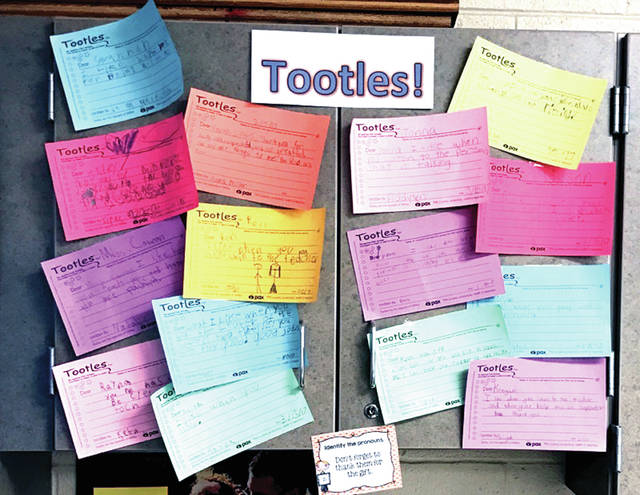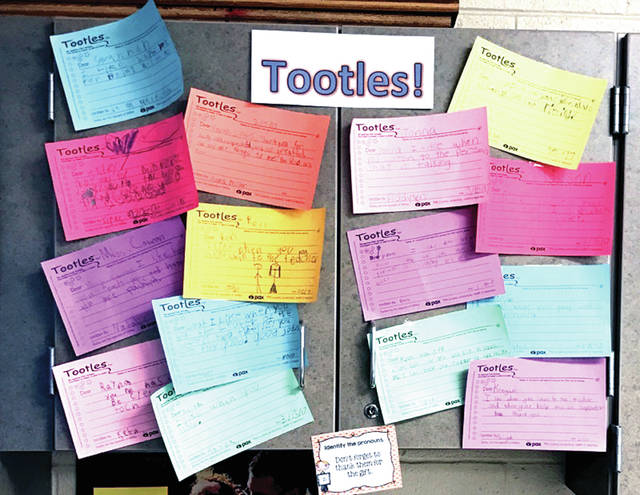



BRADFORD — Bradford Exempted Village School District Elementary Principal Tracy Trogdlon started a program in her school called the PAX Good Behavior Game (GBG).
PAX GBG is a game teaching students how to work toward valued goals and how to cooperate with each other to reach those goals. Through this process, PAX GBG teaches students self-regulation, self-control, and self-management in context of collaborating with others for peace, productivity, health and happiness, according to goodbehaviorgame.org.
According to Trogdlon, PAX GBG was brought to her by some staff members who saw the game in another school district. Bradford is the first Darke County school district to implement the game in the school, she said. In November 2016, the Tri-County Board of Recovery and Mental Health Services approved a $20,611 grant to the Bradford School District to implement the PAX GBG, to cover the costs of the training, a coach and everything needed to set up the program in the classrooms, according to the board’s Executive Director Mark McDaniel.
“This was not from new money from the board, but rather a re-prioritization of existing dollars to fund evidence-based prevention programs,” McDaniel said.
Bradford Schools, in turn, contracted with Dr. Jason Fruth at Wright State University for training and coaching for the teachers and support staff, McDaniel said. According to Trogdlon, all staff were trained on PAX GBG Nov. 28, 2016. Baseline data was collected over the next two weeks. Spleems, or undesired behaviors from students, such as disruptions, were counted. Teachers began teaching the strategies to the students one at a time.
“By January 31, students new all of the strategies, and every classroom was playing the game” Trogdlon said.
On February 2017, teachers began discussions about Tootle Boards, Trogdlon said. A Tootle, opposite of a Tattle is part of the game wherein students are encouraged to write very specific positive peer-to-peer notes.
According to Trogdlon’s most recent data students have demonstrated a significant drop in disruptive behaviors since the implementation of PAX GBG, in early December.
“Teachers have said how well the students do while playing the good behavior game,” Trogdlon said. “Several teachers have commented on how they are able to get through more instruction due to this game. I think it has helped because but it keeps us from labeling at such an early age when a lot of intervention can be done.”
According to McDaniel, a couple of years ago the Tri-County Board made a very deliberate shift in its funding of prevention to only back those efforts that are supported by research or “evidence-based” programs.
For example, in an abstract: “Pax Good Behavior Game: Robust Prevention Engineering for Population-Level Impact” presented June 3, 2016, at the Society for Prevention Research 24th Annual Meeting, Dr. Dennis Embry, President and Senior Scientist of, Paxis Institute, revealed the method and results of a PAX GBG study. His team scaled-up PAX GBG within 14 schools and 247 classrooms in grades one through seven, involving 6,500 students in three South Chicago school districts. Additional replications of PAX GBG implementation and scale-up have included a longitudinal randomized trial within a Canadian province, replications within hundreds of communities in 28 states, and now multiple replications within other countries.
In 2014 alone, some 8,000 teachers received training affecting some 200,000 students, his abstract stated. His conclusion, in part, is the PAX GBG history tells the story about how a simple behavior analysis procedure which had a training protocol and manual and powerful short and long-term results, can be scaled up as a population-level prevention strategy. Such a strategy might enable society to protect against the epidemic of mental, emotional, or behavioral disorders in whole communities, states/provinces, and even nations, the abstract said.
“We are very happy for Bradford and their implementation of the PAX Good Behavior Game,” McDaniel said. “The same offer stands for every school district in the tri-county region. We have been having discussions with a number of them about taking the step too.”
For more information, including research data, visit http://goodbehaviorgame.org/






